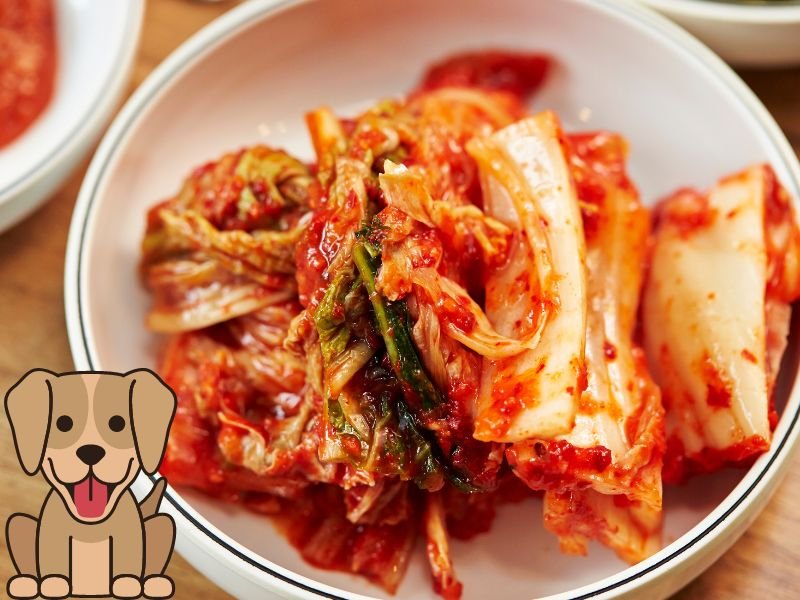While dogs can eat certain human foods, it’s important to be cautious and selective about what you feed them. Kimchi, a traditional Korean dish made from fermented vegetables, is generally not recommended for dogs.
Kimchi typically contains ingredients like garlic, onions, and spices, which can be harmful or even toxic to dogs.
Garlic and onions, in particular, belong to the allium family and can cause damage to a dog’s red blood cells, leading to anemia.
Table of Contents
- Unveiling the Potential Benefits and Risks of Feeding Kimchi to Dogs
- Key Considerations Before Introducing Kimchi into Your Dog’s Diet
- Recognizing Signs of Discomfort and Potential Allergic Reactions in Dogs Consuming Kimchi
- Exploring Alternative Fermented Foods That May Be Safer for Dogs Than Kimchi
- Consulting a Veterinarian: Expert Advice on Dogs and Kimchi Consumption
- FAQs About Can Dogs Eat Kimchi
- Conclusion
Unveiling the Potential Benefits and Risks of Feeding Kimchi to Dogs
While kimchi can provide certain health benefits due to its fermentation process and nutrient composition, it is crucial to be aware of potential risks associated with this spicy food when it comes to our canine companions.
Benefits of feeding kimchi to dogs
- Probiotics: Kimchi is a fermented food that contains beneficial bacteria, known as probiotics, that can support a healthy gut flora in dogs, aiding digestion and overall well-being.
- Vitamins and Minerals: Kimchi is packed with vitamins A, C, and K, as well as minerals like calcium and iron, which can be beneficial for a dog’s immune system and overall health.
Risks of feeding kimchi to dogs
- Spiciness: The primary concern when it comes to feeding kimchi to dogs is its spiciness. The capsaicin present in spicy foods like kimchi can irritate a dog’s stomach and digestive system, leading to discomfort, diarrhea, or vomiting.
- High Sodium Content: Kimchi typically contains a high amount of sodium, which can be problematic for dogs with certain health conditions, such as kidney or heart disease. Excessive sodium intake can potentially lead to water retention and increased blood pressure in dogs.
Before introducing kimchi into your dog’s diet, it is important to consult with your veterinarian.
They can evaluate your dog’s specific health needs, take into account any pre-existing conditions, and provide guidance on whether or not kimchi is suitable for your furry friend.
It is always better to err on the side of caution when it comes to introducing new foods into your dog’s diet and to monitor their reaction closely when introducing kimchi as an occasional treat.
Key Considerations Before Introducing Kimchi into Your Dog’s Diet
Before you decide to incorporate kimchi into your dog’s diet, it is essential to consider a few key factors to ensure their health and well-being.
While kimchi can offer potential benefits, it is important to exercise caution and take into account your dog’s individual needs and any potential risks associated with spicy foods.
1. Understand your dog’s tolerance for spicy foods
Just like humans, dogs can have varying levels of tolerance for spicy flavors. Some dogs may handle kimchi well, while others may experience digestive issues or discomfort.
It is important to be aware of your dog’s sensitivity to spicy foods and proceed accordingly.
2. Consult with your veterinarian
Seeking advice from a veterinarian is crucial before making any changes to your dog’s diet.
They will be able to assess your dog’s specific dietary requirements and advise on whether introducing kimchi is appropriate.
Your veterinarian may also be able to provide alternative suggestions for incorporating fermented foods into your dog’s diet.
3. Start with small portions
If your veterinarian gives the green light to introduce kimchi to your dog, start with small portions as a trial.
This will allow you to observe any adverse reactions or digestive disturbances. Monitor your dog closely for signs of discomfort or allergic reactions, and discontinue feeding kimchi if any issues arise.
4. Consider the ingredients
It is important to carefully read the ingredients list of the kimchi you are considering feeding your dog. Some ingredients commonly found in kimchi, such as garlic or onion, can be toxic to dogs.
Ensure that the kimchi you choose does not contain any harmful ingredients and is made from dog-safe ingredients.
By taking these key considerations into account, you can make an informed decision about whether introducing kimchi into your dog’s diet is suitable.
Remember, every dog is different, and what works for one may not work for another. Always prioritize your dog’s well-being and consult with a veterinarian before making any significant changes to its diet.
Recognizing Signs of Discomfort and Potential Allergic Reactions in Dogs Consuming Kimchi
In order to ensure the well-being of our furry friends, it is essential to be able to recognize signs of discomfort and potential allergic reactions when introducing different foods into their diets, including kimchi.
While kimchi may be suitable for some dogs, it can cause adverse effects on others.
By understanding the signs and symptoms, pet owners can quickly respond and prevent any potential health issues.
Allergic Reactions
Dogs, like humans, can have allergies to certain foods. When it comes to kimchi, the common allergens to watch for include garlic, onions, and chili peppers.
Keep an eye out for symptoms such as itching, redness, hives, swelling, vomiting, diarrhea, or difficulty breathing.
If any of these signs are observed after consuming kimchi, it is crucial to seek veterinary care immediately.
Discomfort and Digestive Issues
Spicy foods like kimchi can irritate a dog’s digestive system, leading to stomach upset and discomfort.
Pay attention to signs such as excessive drooling, licking their lips, restlessness, reluctance to eat, or vomiting.
Additionally, kimchi contains a high sodium content, which can lead to excessive thirst and potential dehydration if not adequately managed.
To ensure your dog’s overall comfort and well-being, it is essential to consult a veterinarian before introducing kimchi or any new foods into their diet.
They will be able to provide personalized advice based on your dog’s individual health needs and dietary considerations.
Remember that every dog is unique, and what may work for one may not work for another. It is important to monitor your dog’s reaction to kimchi and other new foods closely.
If any signs of discomfort or allergic reactions occur, it is recommended to discontinue the use of kimchi as a treatment or part of their diet.
By being vigilant and responsive to our dogs’ needs, we can ensure their safety and avoid potential health risks associated with consuming kimchi.
Exploring Alternative Fermented Foods That May Be Safer for Dogs Than Kimchi
In this section, we will discuss some fermented foods that can be considered safer options for dogs compared to kimchi.
While kimchi contains ingredients like garlic, onions, and spices that may not be suitable for canine consumption, there are other fermented foods that can provide similar benefits without the potential risks.
Yogurt
Plain, unsweetened yogurt can be a great fermented food for dogs. It contains beneficial bacteria, known as probiotics, which can aid in digestion and promote a healthy gut.
It’s important to choose yogurt that doesn’t have any added sugars or artificial sweeteners, as these can be harmful to dogs.
Kefir
Similar to yogurt, kefir is a fermented dairy product that can be beneficial for dogs. It is packed with probiotics and also contains vitamins, minerals, and amino acids.
However, it’s important to introduce kefir gradually into your dog’s diet and observe any potential adverse reactions, as some dogs may be lactose intolerant.
Sauerkraut
Made from fermented cabbage, sauerkraut can be a safe option for dogs. It contains probiotics that support digestive health and is low in calories.
However, make sure to choose plain sauerkraut without any added spices or seasonings that may be harmful to dogs.
Kombucha
This fermented tea drink has gained popularity among humans for its potential health benefits.
While there is limited research on the effects of kombucha on dogs, some pet owners have reported positive outcomes.
If you decide to introduce kombucha to your dog’s diet, start with small amounts and monitor their reaction carefully.
It’s important to note that every dog is different, and what works well for one may not work for another.
When introducing any new food, including fermented options, to your dog’s diet, it’s crucial to do so gradually and monitor their behavior and digestion.
If you notice any signs of discomfort or allergic reactions, it’s best to discontinue the new food and consult with your veterinarian for further guidance.
Consulting a Veterinarian: Expert Advice on Dogs and Kimchi Consumption
Seeking professional guidance is crucial when considering feeding kimchi to your furry friend. Veterinarians possess the necessary knowledge and expertise to evaluate the potential risks and benefits of incorporating kimchi into your dog’s diet.
They can help determine whether it is suitable for your particular dog, considering factors such as their age, underlying health conditions, and dietary requirements.
When consulting a veterinarian about dogs and kimchi consumption, here are a few important topics to discuss:
1. Potential Risks and Allergies
One of the primary concerns is whether your dog may have an allergic reaction to kimchi.
Certain ingredients in kimchi, such as garlic and onions, can be toxic to dogs and cause digestive upset or even more severe health issues.
Consulting with a veterinarian can help identify any potential allergies and determine whether kimchi is safe for your dog.
2. Portion Control and Frequency
Your veterinarian can guide you on how best to introduce kimchi to your dog’s diet. They may recommend starting with small portions as an occasional treat, gradually increasing the amount if no adverse effects are observed.
Additionally, they can advise on the appropriate frequency of kimchi consumption to ensure it does not disrupt your dog’s overall balanced diet.
3. Alternative Fermented Foods
If kimchi is not deemed suitable for your dog, a veterinarian may suggest alternative fermented foods that offer similar health benefits without the potential risks.
Options such as sauerkraut or plain yogurt might be considered, as they can provide probiotics for your dog’s gut health.
Remember, every dog is unique, and their dietary needs may vary. Veterinary advice is invaluable in determining whether kimchi or any other specific food is safe and appropriate for your beloved canine companion. Making informed decisions, guided by professional advice, is the key to ensuring your dog’s well-being and overall health.
FAQs About Can Dogs Eat Kimchi
Is kimchi toxic to dogs?
While kimchi itself is not toxic to dogs, it can cause digestive issues in some dogs. The strong flavors and spices in kimchi may not agree with their stomachs, leading to diarrhea, vomiting, or upset stomach.
Can dogs eat homemade kimchi?
It is not recommended to feed dogs homemade kimchi. The ingredients used in homemade kimchi, such as garlic and onions, can be harmful to dogs. Additionally, the high levels of sodium in kimchi can be detrimental to a dog’s health.
What are the potential benefits of feeding dogs kimchi?
There are no specific benefits associated with feeding dogs kimchi. While some of the ingredients in kimchi, like cabbage, can provide certain nutrients, dogs generally do not require it in their diet and can obtain those nutrients from other sources.
Are there any alternative foods that dogs can eat instead of kimchi?
Yes, there are several alternative foods that dogs can safely eat instead of kimchi. Some examples include plain cooked chicken or turkey, steamed vegetables like carrots or green beans, and plain, unsalted rice.
What should I do if my dog accidentally eats kimchi?
If your dog accidentally eats kimchi, monitor them closely for any signs of digestive distress. If they develop symptoms like vomiting, diarrhea, or appear extremely uncomfortable, contact your veterinarian for further guidance.
Conclusion
In conclusion, while kimchi is not toxic to dogs, it is generally not recommended to feed it to them.
The strong flavors, spices, and high sodium content can potentially cause digestive issues and may not provide any significant benefits to their diet.
It’s best to stick to a balanced diet of dog-friendly foods to ensure their overall well-being.













